- Home
- Burt L. Standish
The Swan and Her Crew Page 19
The Swan and Her Crew Read online
Page 19
CHAPTER XVII.
The Boat-race.--Winning.--Mr. Marston.--Nightingale and Nest.-- The noise of the Nightingales.
The next morning Frank had another row in the four-oar, and in theafternoon they practised starts. The boat went very well indeed,notwithstanding the importation of new blood into it at the last hour.The day of the race came, a beautiful summer day with a gentle breeze,and the glare of the sun subdued by light clouds.
The race was at three o'clock, and a goodly company had assembled atWhitlingham to witness it. The course was from below Postwick Grove toWhitlingham, a distance of two miles, the latter part of which was along straight course, where for nearly a mile the boats could be seen byall the spectators.
"How do you feel, old man?" said Jimmy to Frank as he was in theboat-house dressing.
"Oh, all right; we mean to win."
"I don't know that you will though. I have seen the other crew rowingpast on their way to the course. They have got such a splendid longstroke and swing so evenly."
"Yes, they row well," said Marston, who was the stroke of Frank's boat,"but they have not got enough of 'go' in them. They take it too easily,and so don't get a good grip of the water; and I think they haveover-trained. Still we shall have a hard job to beat them, but we allmean to try. Now look here, you fellows. This is what I mean to do. Wewill put on a spurt at first, and get ahead of them, and then settledown into a steady stroke."
This was very good advice, for it is a well-known fact that boys rowwith all the more _esprit_ if they can only get a start at thebeginning. They are not so good at rowing a 'waiting' race as men are,but if they can but get ahead at first they always have a very goodchance against men who are much stronger than themselves.
Dick and Jimmy went to their yacht, and as the wind, although light,was dead aft, they sailed down to Whitlingham before the racing-boatsarrived there. There was a goodly number of spectators on the fair greenmeadow which lies between the river and the wood, for the race hadexcited some interest. The gay dresses of the ladies made the scene verylively and pretty. Dick gallantly made it known that the yacht, whichthey had moored by the winning-post, was at the service of the ladies,and his offer was taken advantage of, and the _Swan's_ deck was sooncrowded with the fair sex.
The Norwich boat was the first to appear on the scene. On they came witha long swinging stroke on their way to the starting-point. Nothing couldbe prettier to look at than their style of going. The crew rowed a longstroke which had every appearance of strength. They bent to and fro withthe regularity of machines. The oars were pulled well home to thebreast, the wrists dropped, and the oars feathered cleverly; the armsshot out, quickly followed by the body until the breast came wellbetween the wide-open knees, but there was just one fault noticeable.The oars were put too gingerly into the water. There was no 'grip.' Themen looked as if their boat were too light for them, and they wereafraid of making her roll by too great an exertion of force. The men,too, looked pale and over-trained.
A few minutes after they had passed, the boys came by with a quick,lively stroke, such a quick dash in it, and a firm grip of the water atthe commencement of the stroke, that promised to do them good service.They did not go nearly so smoothly as their opponents; nor was this tobe wondered at, seeing the change which had been effected so late in theday.
Dick and Jimmy ran down the bank of the river to the starting-point,accompanied by many more.
And now the boats were side by side, waiting for the signal to start. Asthe wind was light there was not much drifting, and a few strokes of theoars of bow and stroke kept them in position.
Frank settled himself well on his seat, and waited for the word. Thestarter said, "I shall ask if you are ready and then say Go!"
"Now mind," said Marston, "one short stroke to get her away, and thenrow with all your might to get her ahead."
"Are you ready?"
Frank grasped his oar firmly, and drew in his breath.
"_Go!_"
The oars flashed in the water, and then it seemed to Frank as if theother crew were fast drawing away from them. He clenched his teeth andthrew all his power into the stroke, pulling with every muscle of hisbody from his scalp to his toes. The river was white with the foamchurned by the oars. There seemed to be a deafening noise of rushingwater and rattle of oars in the rowlocks. Marston's jersey had been hungon a nail, and this had caused a projection in it at the back of theneck. On this Frank fixed his eyes, neither looking to right or left ofhim for fear he should make the boat roll and lose time. Then out of thecorner of his eye he saw that he was opposite number two in the rivalboat, and he knew that they were gaining. Another dozen strokes and theywere clear. Then Marston eased a bit, and the boys got into a littlebetter time. Their coxswain tried to take the water of the other boat,and thus nearly caused a foul at the bend in the river, but Marstonshook his head at him and he steered his own course.
Frank had now lost his nervousness, and felt pretty comfortable and ableto take a little notice of what was passing on the banks, where a smallcrowd was running at the top of its speed abreast of them; a noise whichhad been humming in his ears resolving itself into the eager shouts ofthe partisans of the rival crews.
Dick was well in advance, saying, "Well rowed, number three; splendidlyrowed, Frank;" and Jimmy was a little way behind him shouting asexcitedly. Frank for a time fell into the error of thinking that he wasdoing the real work of the boat, and began to row somewhat tooviolently, when a warning voice from the bank cried out--"Steady, steadynumber three!" and that recalled him to himself.
They were now in the straight reach, and in sight of the winning-post,and their opponents were steadily gaining on them. "Why doesn't Marstonquicken?" thought Frank impatiently; but his stroke knew what he wasabout, and he kept on steadily until the boats were level once more.Frank's hands were becoming numbed, for he was so afraid of slipping hisoar that he grasped it more firmly than was needful. His wind was goingtoo, and his tongue seemed swollen and clove to the roof of his mouth.He ventured a side glance at number three in the other boat, and wasrelieved to find that he seemed in quite as bad a plight as himself. Anunlucky swan got in the way, and Frank struck it violently with his oar,and very nearly caught a crab in consequence. A sudden puff of wind blewsomebody's hat off, and Frank smiled as he saw it float past and knewthat it was Dick's.
The oars flashed with increasing quickness, the shouts on the bank grewlouder, and still the long slim boats swept over the water side by side,their opponents drawing slightly ahead.
PAIR-OARED BOAT.]
"Now!" gasped Marston; and Frank knew that the time for the final spurthad come, and if the stroke had been quick before it was doubly so now.Frank felt that each stroke must be his last, but he struggled on; andjust as he felt faint (for his want of training had told) and he lostsight of the other boat in a mist, he heard the sound of a pistol andknew that the winning post was reached.
"Who's won?" he managed to ask.
"We have, by half a length," answered the coxswain.
MR. MARSTON'S HOUSE.]
They drew close up to the bank amid the cheers of the people, and theystaggered ashore; and Frank went away a little distance and leanedagainst a tree with his face to the wind, trying to regain his breathagain. Who does not know the agony of thus fighting for breath after asevere struggle! Even the excitement of victory does not atone at themoment for the penalty of over-exertion. Dick and Jimmy fanned him withtheir hats--or rather Dick used his handkerchief, for his hat had goneto the bottom by this time.
As soon as he had got his wind back Frank turned to the others, and wasat once seized by his companions and raised on their shoulders, and thencarried in triumph to a carriage where some ladies sat. A tall clergymanapproached, and he said,--
"You rowed splendidly, number three; wonderful, considering, as I amtold, you had no training for the race. I hope you will be none theworse for it. Will you have some champagne?"
NIGHTINGALE.]
"Now then, Frank," said Marston, "it is your turn." Frank played andthen asked,
"Is not that bird a nightingale?"
"Yes, her nest is at the bottom of that bush. Watch how she goes to it."
NIGHTINGALE'S NEST.]
The bird hopped about in a promiscuous sort of way, just as if therewere no nest there, and then, when she got near it, she hopped upon itin quite an accidental manner.
"She knows that we know her nest is there, because we look at it everyday, but she always pretends she is only there by accident."
Frank went to look at the nest. It was untidy in make, built of strawand twigs, and lined with leaves. It contained five olive-brown eggswhich were near to hatching.
"You must not take any of these, Mr. Merivale," said Miss Marston.
"No, I do not wish to do so," said Frank, but his looks so belied hiswords that they all laughed at him.
"There are two more nests about the grounds," said Marston, "and I havesome eggs in the house which you can have."
Frank thanked him, and asked if there were any more nightingales about.
"There are so many about that many times I cannot go to sleep for thenoise they make."
"Noise!" said his sister reproachfully.
"Yes, when it is dinned into one's ears so much, any singing becomesnoisy."
Frank thought his friend was joking, but about ten o'clock they werestrolling about the grounds in the bright moonlight, and then they heardnightingales singing all round them. The boys thought they had neverheard such sweet sounds. First the song would commence with an intenselysweet, low, single note or pipe. Then would follow a strong clear floodof melody which was entrancing in its richness. Then the bird wouldcease, and in a few seconds another bird would answer from a littledistance. Then the first one would reply, and a third would take up thestrain from a different quarter. The moonlight silence of the night, theravishing strains of bird music which made the grove vocal, and theheavy fragrance of the flowers which floated on the dewy air, made theevening most perfect and beautiful.

 Dick Merriwell Abroad; Or, The Ban of the Terrible Ten
Dick Merriwell Abroad; Or, The Ban of the Terrible Ten Wild Adventures round the Pole
Wild Adventures round the Pole Storm-Bound; or, A Vacation Among the Snow Drifts
Storm-Bound; or, A Vacation Among the Snow Drifts In the Yellow Sea
In the Yellow Sea Frank Merriwell's Triumph; Or, The Disappearance of Felicia
Frank Merriwell's Triumph; Or, The Disappearance of Felicia Treasure of Kings
Treasure of Kings Bert Wilson's Twin Cylinder Racer
Bert Wilson's Twin Cylinder Racer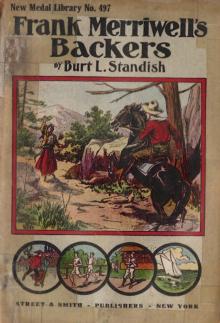 Frank Merriwell's Backers; Or, The Pride of His Friends
Frank Merriwell's Backers; Or, The Pride of His Friends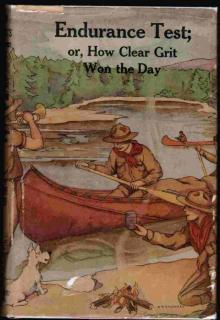 Endurance Test; or, How Clear Grit Won the Day
Endurance Test; or, How Clear Grit Won the Day Great Hike; or, The Pride of the Khaki Troop
Great Hike; or, The Pride of the Khaki Troop The Swan and Her Crew
The Swan and Her Crew A cup of sweets, that can never cloy: or, delightful tales for good children
A cup of sweets, that can never cloy: or, delightful tales for good children Frank Merriwell's Bravery
Frank Merriwell's Bravery Frank Merriwell Down South
Frank Merriwell Down South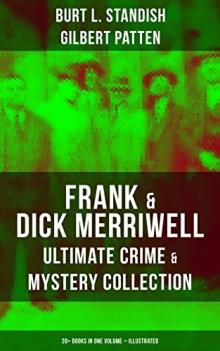 Dick Merriwell's Trap; Or, The Chap Who Bungled
Dick Merriwell's Trap; Or, The Chap Who Bungled The Trail of the Seneca
The Trail of the Seneca Wild Life in the Land of the Giants: A Tale of Two Brothers
Wild Life in the Land of the Giants: A Tale of Two Brothers From Squire to Squatter: A Tale of the Old Land and the New
From Squire to Squatter: A Tale of the Old Land and the New The Cruise of the Snowbird: A Story of Arctic Adventure
The Cruise of the Snowbird: A Story of Arctic Adventure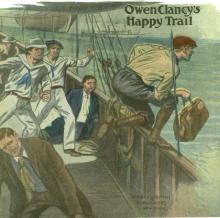 Owen Clancy's Happy Trail; Or, The Motor Wizard in California
Owen Clancy's Happy Trail; Or, The Motor Wizard in California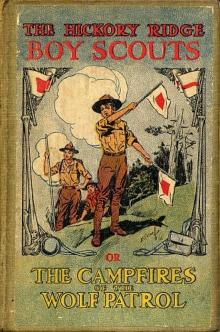 Boy Scouts: Tenderfoot Squad; or, Camping at Raccoon Lodge
Boy Scouts: Tenderfoot Squad; or, Camping at Raccoon Lodge Sing a Song of Sixpence
Sing a Song of Sixpence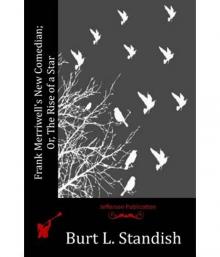 Frank Merriwell's New Comedian; Or, The Rise of a Star
Frank Merriwell's New Comedian; Or, The Rise of a Star The Sa'-Zada Tales
The Sa'-Zada Tales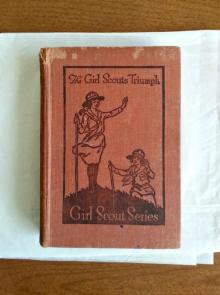 The Girl Scout's Triumph; or, Rosanna's Sacrifice
The Girl Scout's Triumph; or, Rosanna's Sacrifice Wild Adventures in Wild Places
Wild Adventures in Wild Places Fairies I Have Met
Fairies I Have Met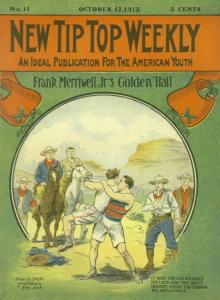 Frank Merriwell's Son; Or, A Chip Off the Old Block
Frank Merriwell's Son; Or, A Chip Off the Old Block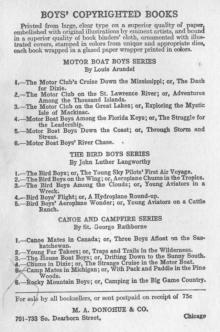 Motor Boat Boys' River Chase; or, Six Chums Afloat and Ashore
Motor Boat Boys' River Chase; or, Six Chums Afloat and Ashore Frank Merriwell's Athletes; Or, The Boys Who Won
Frank Merriwell's Athletes; Or, The Boys Who Won Bart Keene's Hunting Days; or, The Darewell Chums in a Winter Camp
Bart Keene's Hunting Days; or, The Darewell Chums in a Winter Camp Captain June
Captain June